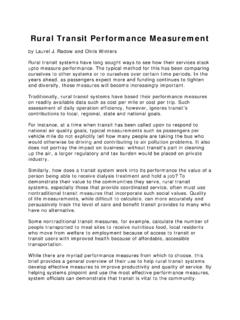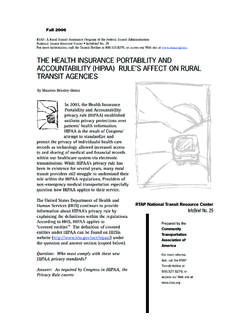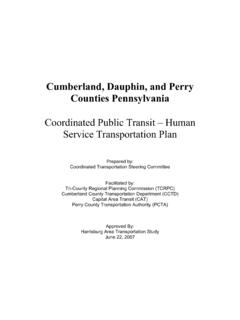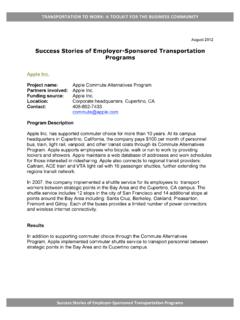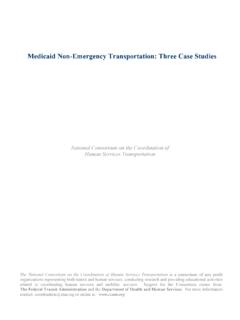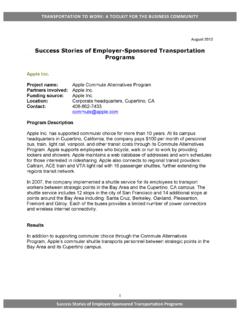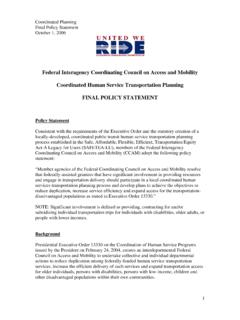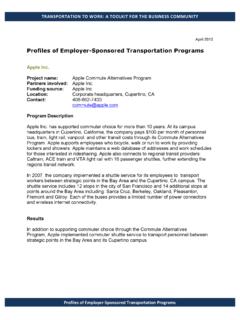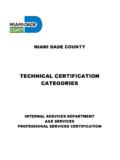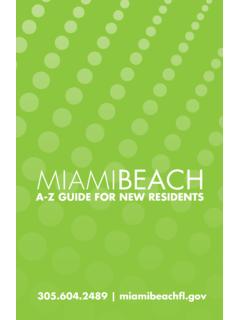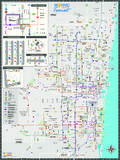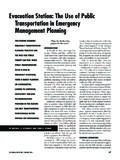Transcription of MEDICAID TRANSIT PASSES - ctaa.org
1 MEDICAID TRANSIT PASSES : A Winning Solution for All Department of Health and Human Services Department of Transportation MEDICAID TRANSIT PASSES The Good News Story Issuing a tiny bus pass is translating to million dollar savings in MEDICAID transportation these and million dollar revenues for TRANSIT authorities. The savings then free up funds to expand MEDICAID services. Meanwhile, public TRANSIT agencies increase their revenues and can provide more and/or better services. When appropriate, it s a matter of shifting physically able MEDICAID participants from paratransit (which could cost about 10 times the cost of TRANSIT fares) to TRANSIT services. Instead of paying for paratransit services, physically able MEDICAID clients, with access to a bus route, are issued a monthly bus pass.
2 Take a look at the numbers, based on experiences so far: Nationwide, percent of the population receive MEDICAID assistance. If only percent (conservative number) of the eligible MEDICAID clients in the nation s 20 largest metropolitan areas were shifted to TRANSIT , annual savings of about $108 million could be realized. If percent used TRANSIT , the savings would be about $215 million per year. Projecting additional fares to TRANSIT agencies at 20 percent of the savings to the MEDICAID program a figure based on experience in Miami-Dade County, Florida TRANSIT authorities in the nation s 20 largest metropolitan areas could gain as much as $21 to $43 million annually. MEDICAID : What it is; What it does Title XIX of the Social Security Act is a Federal-State matching program that pays for medical assistance for certain vulnerable and needy individuals and families with low incomes and resources.
3 This program, known as MEDICAID , became law in 1965. MEDICAID is one of the largest sources of funding for medical and health-related services for America s poorest people. In 1996, it provided health care assistance to more than 36 million persons, at a cost of $160 billion dollars. Within broad national guidelines established by Federal statutes, regulations and policies, each State: 1) establishes its own eligibility standards; 2) determines the type, amount, duration, and scope of services; 3) sets the rate of payments for services; and 4) administers its own program. A person who is eligible for MEDICAID in one State might not be eligible in another State; and the services provided by one State may differ considerably in amount, duration, or scope from services provided in a similar or neighboring State.
4 MEDICAID eligibility and/or services within a State can even change during the year. WHAT ARE MEDICAID TRANSIT PASSES ? For several decades, many human service agencies, including MEDICAID , have needed to provide special transportation services to their clients to get them to required destinations. These agencies either purchased and operated their own vehicles or purchased transportation from others. This approach may be costly, inefficient and difficult to manage. MEDICAID TRANSIT PASSES involve the local or state MEDICAID office (or an agency appointed or subcontracted by them) contracting with the local TRANSIT authority to purchase monthly TRANSIT PASSES . These TRANSIT PASSES are then distributed to MEDICAID clients who are able to use public transportation for medical travel needs.
5 MEDICAID TRANSIT PASSES : a Win-Win-Win Public transportation benefits: Maximizes the use of existing vehicles Increases revenues Increases ridership (primarily off peak, evenings and weekends when capacity is available) MEDICAID agency benefits: Substantially increases the cost-effectiveness of the transportation services purchased for clients Maximizes the use of transportation dollars Generates transportation cost savings that can be applied to serving more clients or expanding other program areas Improves the mobility, independence and quality of life of clients Transportation disadvantaged persons benefits: Eliminates the need for advance scheduled reservations Provides greater mobility and independence "Mainstreams" riders with general public instead of segregating them in paratransit vehicles Provides TRANSIT options The Health Care Financing Administration (HCFA) noted in a December 1996 letter to State MEDICAID Directors that monthly bus pass programs can be used if they are cost-effective and appropriate to the individual s needs and personal situation.
6 The TRANSIT PASSES offer the opportunity of multiple trips per month at a great savings to the MEDICAID agency. Local conditions will, however, affect specific break-even points such as the proportion of MEDICAID recipients in the population, the numbers of medical trips per month required, and the local costs of monthly TRANSIT PASSES . MEDICAID Transportation How TRANSIT PASSES Fit In Persons served by the MEDICAID program certain children and adults in low income households often lack reliable transportation. This interferes with their ability to obtain the medical care they need and can receive through the MEDICAID program. Federal regulations mandate that each State MEDICAID agency must describe how they will "ensure necessary transportation for clients to and from providers" for clients without their own transportation.
7 Each state designs and operates its own MEDICAID transportation program; as a result, there are large differences in non-emergency MEDICAID transportation programs among the states. DIFFERENT TYPES OF MEDICAID TRANSIT PASS activities There are several different models of MEDICAID TRANSIT Pass activities. This brochure highlights the following models: Connecticut Statewide, operated through brokered services Florida Countywide, operated by county government Pennsylvania Citywide, operated by a private non profit WASHIN gton Countywide, operated through a brokered system New Jersey Pilot program in two counties overseen by state government. Most of the State MEDICAID offices that use MEDICAID TRANSIT PASSES bill the Federal MEDICAID program for eligible trips as an administrative under the medical expense category.
8 This allows the states to have more control over the management of the program; more specifically, the brokers can determine which transportation providers will be used (eliminating the clients option to specify a particular transportation provider under the "freedom of choice" rules that govern state MEDICAID expenses reimbursed by the Federal government under the medical expense category). When brokers can select which transportation provider to use, they can provide more rides with increased cost-effectiveness. Examples follow: THE STATE OF CONNECTICUT Over $4 million saved MEDICAID medical transportation in Connecticut is administered by Managed Care Organizations (MCOs) and the state s Department of Social Services. MCOs are responsible for providing medical transportation for about 220,000 of the state s 310,000 MEDICAID clients.
9 The state directly administers transportation benefits to the remaining 90,000 clients. Transportation services administered by the State: On February 1, 1998, the Connecticut Department of Social Services implemented the non-emergency medical transportation brokerage project, administering transportation benefits to its 90,000 clients through contracts with transportation brokers. The purpose of the project is to ensure that quality medical transportation services are provided at a minimum cost. This project resulted in a savings to the department of approximately $3 million during fiscal year 1998-99. The target population for state-administered MEDICAID non-emergency transportation services is persons eligible under the Connecticut MEDICAID and General Assistance Programs in the department s five geographical regions who are not enrolled in a MEDICAID Managed Care Plan.
10 The majority of these clients are elderly and disabled. The transportation brokers are responsible for: coordinating trips through subcontracts between the transportation vendors and the brokers; marketing and outreach; maintaining a sufficient number of phone lines to accommodate client calls; maintaining a sufficient number of dedicated vehicles for demand response trips; resolving complaints and grievances; operating and maintaining a quality assurance system to measure service quality and timeliness; and compliance with the department s reporting requirements. The department makes monthly payments to the brokers based on a per person rate. These rates reflect the results of competitive bidding and the department s estimate of the monthly enrollment and transportation costs that would otherwise occur in the fee for service setting.
